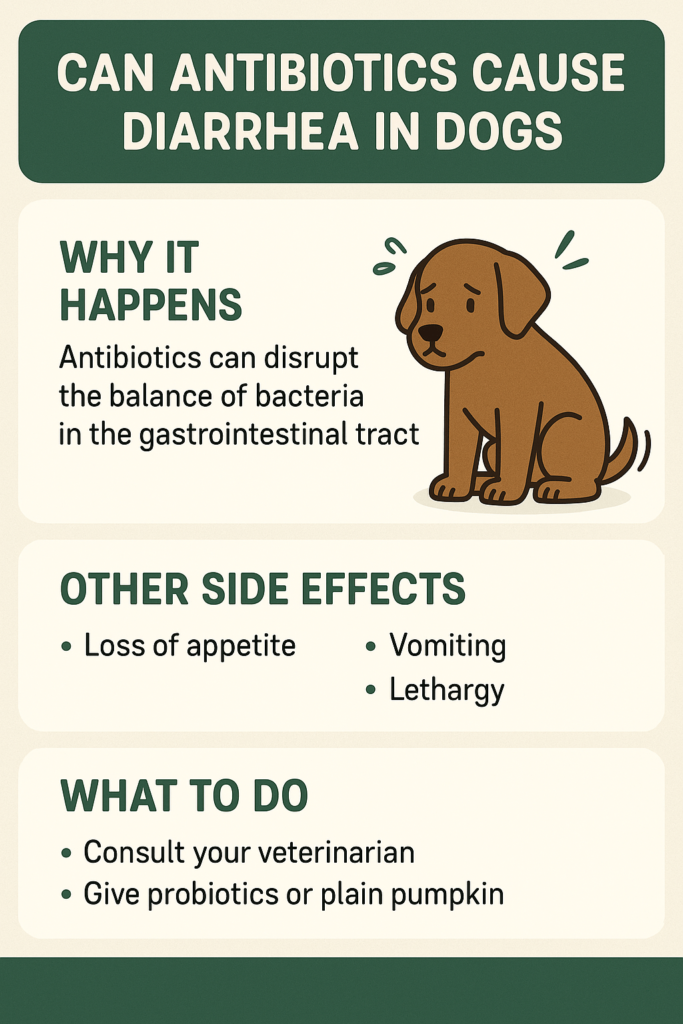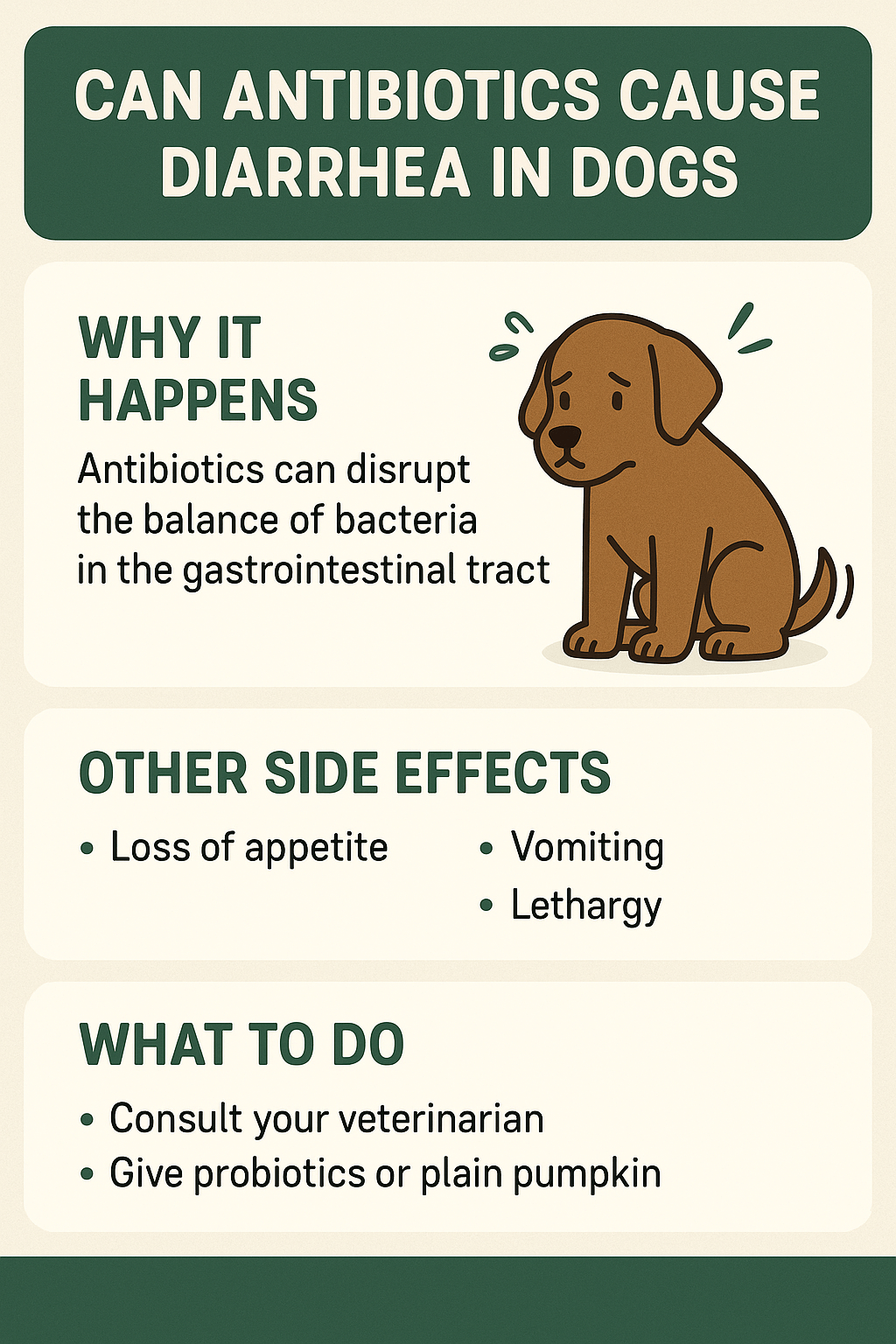Can Antibiotics Cause Diarrhea in Dogs?
Antibiotics are a vital tool in veterinary medicine, helping to treat bacterial infections and improve your dog’s health. However, like any medication, they can have side effects—and one common concern is diarrhea. If your furry friend experiences loose stools while on antibiotics, it can be alarming, but understanding the cause and how to manage it can make all the difference. In this blog post, we’ll explore why antibiotics may lead to diarrhea, how to recognize the symptoms, and what steps you can take to support your dog’s digestive health during treatment. Let’s dive into everything you need to know to keep your pup comfortable and healthy.
Expert Insight on Pet Medication Side Effects
“Pets can experience side effects to medications they are given, just like people. These can range from mild to more severe reactions, depending on many factors. It’s always best to discuss the risks of a drug with your veterinarian and decide if the potential benefits outweigh the potential side effects. If you suspect your pet is having any side effects, speak with your veterinarian as soon as possible to determine the next steps.”
Why Antibiotics Can Cause Diarrhea in Dogs
Antibiotics are designed to target harmful bacteria, but they don’t always distinguish between “good” and “bad” bacteria in your dog’s gut. This disruption of the natural balance can lead to gastrointestinal upset, including diarrhea. Here are some key reasons why this happens:
Disruption of Gut Flora:
Antibiotics kill beneficial bacteria in the gut along with harmful ones, disrupting the delicate balance that supports digestion.Overgrowth of Harmful Bacteria:
Without enough good bacteria to keep them in check, harmful bacteria like Clostridium or E. coli can multiply, leading to digestive issues.Sensitivity of the Digestive System:
Some dogs have more sensitive stomachs than others, making them more prone to side effects from medications.Type of Antibiotic Used:
Certain antibiotics, such as amoxicillin or tetracycline, are more likely to cause gastrointestinal disturbances due to their broad-spectrum effects.Length of Treatment:
Prolonged antibiotic use increases the risk of diarrhea as the gut flora has less time to recover between doses.
Understanding these factors helps explain why diarrhea occurs and highlights the importance of monitoring your dog’s condition during antibiotic therapy.

Signs Your Dog May Have Antibiotic-Related Diarrhea
Recognizing the symptoms of antibiotic-related diarrhea is crucial for addressing the issue promptly. Keep an eye out for these signs to ensure your dog stays comfortable and healthy.
Loose or Watery Stools:
The most obvious sign is frequent, unformed stools that differ from your dog’s normal bowel movements.Increased Frequency of Bowel Movements:
If your dog is going to the bathroom more often than usual, it could indicate digestive distress.Loss of Appetite:
Diarrhea can make your dog feel unwell, leading to a reduced interest in food.Lethargy or Weakness:
Dehydration from diarrhea may leave your dog feeling tired or less active than usual.Vomiting or Nausea:
In severe cases, diarrhea may be accompanied by vomiting, signaling a more serious issue.
If you notice any of these symptoms, it’s important to act quickly to prevent complications and support your dog’s recovery.
Check this guide 👉Antibiotics for Dog Diarrhea: Best 7 Health Tips!
Check this guide 👉Rice for Dog Diarrhea: Best 7 Expert Tips!
Check this guide 👉Dog Diarrhea After Food Change: Best 7 Expert Tips!
Preventing Antibiotic-Related Diarrhea | Managing Diarrhea if It Occurs |
|---|---|
Provide probiotics during treatment | Offer bland, easily digestible food |
Ensure plenty of fresh water | Monitor hydration levels closely |
Limit stress and changes in routine | Consult your vet if symptoms persist |
Use antibiotics only when necessary | Avoid giving human medications without approval |
Gradually reintroduce regular diet | Keep track of stool frequency and consistency |
How to Prevent Antibiotic-Related Diarrhea
While not all cases of antibiotic-related diarrhea can be avoided, there are proactive measures you can take to minimize the risk. These strategies focus on supporting your dog’s digestive health throughout treatment.
Supplement with Probiotics:
Probiotics help replenish beneficial bacteria in the gut, reducing the likelihood of digestive upset.Maintain Hydration:
Encourage your dog to drink plenty of water to prevent dehydration, which can worsen diarrhea.Feed a Balanced Diet:
Stick to high-quality, nutrient-rich foods that support overall health and digestion.Monitor Your Dog’s Behavior:
Watch for early signs of discomfort or changes in bowel habits so you can address issues promptly.Follow Your Vet’s Instructions Carefully:
Administer antibiotics exactly as prescribed to avoid unnecessary strain on your dog’s system.
By taking these preventive steps, you can help your dog stay comfortable and reduce the chances of diarrhea during antibiotic therapy.
When to Contact Your Veterinarian
While mild diarrhea can sometimes resolve on its own, certain situations require immediate veterinary attention. Knowing when to seek help ensures your dog receives the care they need.
Persistent Diarrhea Lasting More Than 48 Hours:
If diarrhea doesn’t improve within two days, it’s time to consult your vet for further evaluation.Blood or Mucus in Stool:
The presence of blood or excessive mucus indicates a potentially serious underlying issue.Signs of Dehydration:
Symptoms like dry gums, sunken eyes, or lethargy suggest your dog may be dehydrated and in need of medical intervention.Severe Vomiting Alongside Diarrhea:
Frequent vomiting combined with diarrhea can quickly lead to dehydration and requires urgent care.Lack of Improvement Despite Home Care:
If home remedies fail to alleviate symptoms, professional guidance is essential to identify the root cause.
Prompt action can prevent complications and ensure your dog recovers fully from antibiotic-related diarrhea.
Common Mistakes to Avoid
When dealing with antibiotic-related diarrhea in dogs, certain mistakes can worsen the situation. Avoiding these pitfalls ensures a smoother recovery process.
Stopping Antibiotics Prematurely:
Halting treatment before completing the prescribed course can lead to antibiotic resistance and unresolved infections.Feeding Rich or Spicy Foods:
Offering inappropriate foods can irritate your dog’s stomach further instead of aiding recovery.Ignoring Hydration Needs:
Failing to ensure adequate water intake increases the risk of dehydration, especially during bouts of diarrhea.Using Over-the-Counter Medications Without Approval:
Human medications can harm dogs and should never be given without veterinary consultation.Assuming All Diarrhea Is Mild:
Not all cases are harmless—some may indicate a more serious condition requiring immediate attention.
By steering clear of these errors, you can better support your dog’s healing journey.
Foods to Avoid During Recovery
Certain foods can exacerbate diarrhea or hinder recovery. Being mindful of your dog’s diet during this time is crucial for restoring their digestive health.
Dairy Products:
Many dogs are lactose intolerant, and dairy can worsen diarrhea by irritating the gut.Fatty or Greasy Foods:
High-fat foods are difficult to digest and can prolong digestive upset.Raw Meat or Eggs:
While raw diets have their place, they pose a contamination risk and should be avoided during recovery.Processed or Sugary Treats:
Artificial additives and sugars can disrupt gut flora and delay healing.Table Scraps or Leftovers:
Human food often contains ingredients that are unsafe or unsuitable for dogs.
Sticking to veterinarian-recommended foods ensures a faster and safer recovery.
Long-Term Strategies for Gut Health
Supporting your dog’s gut health after antibiotic treatment can prevent future episodes of diarrhea and promote overall well-being. These long-term strategies focus on maintaining a balanced digestive system.
Continue Probiotic Supplementation:
Even after finishing antibiotics, probiotics can help restore and maintain a healthy gut microbiome.Incorporate Fiber-Rich Foods:
Foods like pumpkin or sweet potatoes provide fiber that aids digestion and regulates bowel movements.Minimize Stressful Situations:
Stress negatively impacts gut health, so creating a calm environment benefits your dog’s digestive system.Schedule Regular Vet Check-Ups:
Routine exams help catch potential issues early and ensure your dog remains in optimal health.Avoid Unnecessary Antibiotics:
Work with your vet to determine if antibiotics are truly needed, as overuse can harm gut flora over time.
These practices foster resilience in your dog’s digestive system, reducing the likelihood of future problems.
Frequently Asked Questions About Antibiotics and Diarrhea in Dogs
Can I give my dog yogurt to help with diarrhea?
Plain, unsweetened yogurt with live cultures may help, but consult your vet first, as some dogs are lactose intolerant.
How long does antibiotic-related diarrhea last?
Mild cases typically resolve within a few days, but persistent diarrhea lasting more than 48 hours warrants veterinary attention.
Are probiotics safe for dogs?
Yes, many probiotic supplements are specifically formulated for dogs and are safe when used as directed.
What should I do if my dog refuses to eat?
Offer small amounts of bland food like boiled chicken and rice. If they still refuse, contact your vet.
Can I prevent diarrhea before starting antibiotics?
Starting probiotics before and during treatment can reduce the risk of digestive upset.
Supporting Your Dog Through Antibiotic Treatment
Antibiotics play a vital role in treating bacterial infections, but their impact on your dog’s digestive system cannot be ignored. By understanding the causes of antibiotic-related diarrhea and implementing preventive measures, you can minimize discomfort and support your dog’s recovery. Whether through dietary adjustments, probiotic supplementation, or close monitoring, your efforts will go a long way in ensuring your furry friend stays happy and healthy. Remember, your vet is always your best resource—don’t hesitate to reach out if you have concerns. With proper care, your dog can bounce back stronger than ever!
Do Cats Have Taste Buds? Best 7 Expert Tips! – Discover how cats experience flavors and why their taste is so unique.
Do Dogs Have Taste Buds? Best 7 Expert Tips! – Discover how dogs experience taste, their preferences, and what it means for their diet and health.
Can Cats Taste Sweet? Best 7 Expert Tips! – Discover why cats can’t taste sweetness, how it affects their diet, and tips to keep them healthy and happy.
Can Dogs Taste Sweet? Best 7 Expert Tips! – Discover how dogs perceive sweetness, which foods are safe, and tips to manage their sweet cravings responsibly.





